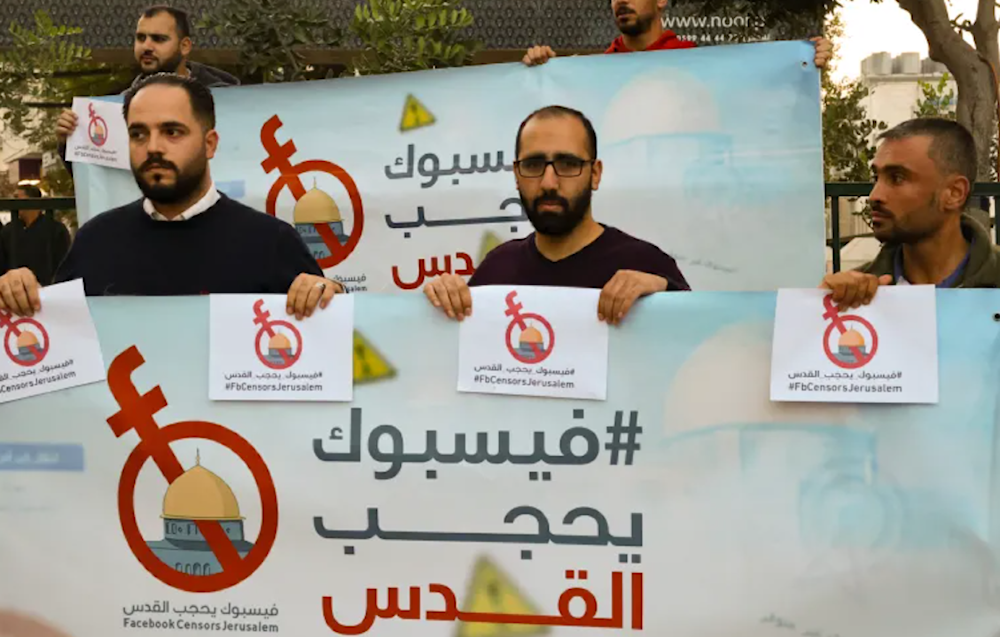Censoring Palestine: Flawed Meta policies, undue gov. influence - HRW
A HRW report published Thursday reveals a pattern of unjustified removal of pro-Palestine content.
-

Palestinian activists and journalists hold banners denouncing censorship by Facebook of pro-Palestine content, in the occupied West Bank city of al-Khalil (AFP)
Human Rights Watch (HRW) issued a report Thursday titled "Meta's Broken Promises: Systemic Censorship of Palestine Content on Instagram and Facebook," which reveals how moderation rules and algorithms have progressively repressed voices in support of Palestine on Instagram and Facebook and suppressed protected speech, including nonviolent communication in favor of Palestine and public discussion about Palestinian human rights.
According to HRW, an overreliance on automated technologies to monitor material and disproportionate government control over content deletions contribute to censorship.
Deborah Brown, acting associate technology and human rights director at HRW, said the censorship added "insult to injury at a time of unspeakable atrocities and repression already stifling Palestinians’ expression."
Brown notes that social media is a tool to witness this abuse and speak out against it and that censorship only furthers the suffering of Palestinians.
See this: Meta admits to censoring Palestinian content
HRW investigated 1,050 instances of online restriction from more than 60 nations where 6 patterns of censorship were identified, each happening at least 100 times.
The incidents are consistent with years of research and campaigning by Palestinian, regional, and international human rights organizations, showing Meta's filtering of Palestinian-supporting content.
These patterns include content removals, account suspension or deletion, inability to engage with content, inability to follow or tag accounts, restrictions on the use of features, such as Instagram/Facebook Live, and "shadow banning", which refers to a significant reduction in the visibility of an individual's posts, stories, or account without notification.
Meta used its "Dangerous Organizations and Individuals" (DOI) policy in hundreds of documented incidents, which fully includes the United States-recognized lists of "terrorist organizations". Meta has invoked these lists and used them broadly to limit the legal expression of pro-Palestine voices.
Meta's restrictions against violent and graphic content, violence and incitement, hate speech, nudity, and sexual activity were also misapplied. It has enforced its "newsworthy allowance" policy inconsistently, eliminating scores of pieces of content showing Palestinian injury and death that had news value.
A previous HRW report in 2021 indicated Meta was “silencing many people arbitrarily and without explanation" regarding discussions about Palestine and "Israel".
Broken promises amplified patterns of abuse
Meta's own independent oversight board has rebuked the social media giant for removing posts depicting human suffering in the war on Gaza.
Established by Meta in 2020 as a quasi-supreme court for the platform, the board overturned two decisions, including the removal of an Instagram video exposing the aftermath of a strike near Al-Shifa Hospital in Gaza during the Israeli ground invasion.
The board urged Meta to preserve removed posts that might serve as evidence of human rights violations.
While Meta committed to making a number of adjustments to its rules and their implementation in content moderation, HRW found that, over two years later, Meta has not fulfilled its pledges, and the corporation has failed to satisfy its human rights duties, resulting in what HRW described as "broken promises that replicated and amplified patterns of abuse."
HRW called for Meta to satisfy its human rights due diligence requirements, ensuring that decisions to remove content are transparent, consistent, and not unduly broad or prejudiced, in addition to allowing protected expression on its platforms, especially regarding human rights abuses and political movements.
The organization also suggested that Meta revise its policy on "dangerous organizations and individuals" to ensure compliance with international human rights norms, examine its "newsworthy allowance" policy to verify that it does not delete information of public interest and that it is used in an equal and non-discriminatory manner, and investigate the human rights implications of the interim alterations to its recommendation algorithms that it implemented in reaction to the recent war.
Brown remarked that rather than use "tired apologies and empty promises," Meta should take steps to show it is serious about ending Palestine-related censorship and move toward "transparency and remediation."

 4 Min Read
4 Min Read








